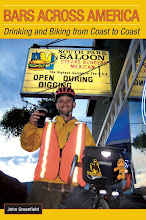 One of Chicago's 2008 Sunday Parkways events
One of Chicago's 2008 Sunday Parkways eventsCar-free "ciclovia" events are flourishing in cities across the country. So why did Chicago's fizzle?
by John Greenfield
[This article also runs in Time Out Chicago, www.timeoutchicago.com.]
In 2003, Randy Neufeld, cofounder of Active Transportation Alliance (ATA), formerly Chicagoland Bicycle Federation, came home from Bogotá, Colombia, jazzed about the Sunday Ciclovia. The weekly event, happening since 1982, closes a 70-mile road network to cars so 2 million people can walk, bike, play and dance in the streets.
“It’s amazing to see so many people out and active,” says Gin Kilgore, a Chicago cyclist who recently rode in Bogotá’s ciclovia (“bike path”) with her three-year-old son, Miguel. “It’s a completely safe, celebratory experience.”
 Bogotá’s Sunday Ciclovia
Bogotá’s Sunday CicloviaSoon after Neufeld returned, ATA, a nonprofit that promotes walking, biking and transit use in Chicago, began lobbying the city to stage a ciclovia to encourage healthy recreation. In 2006, the Chicago Department of Transportation (CDOT) released its Bike 2015 Plan, which called for establishing Sunday Parkways, a car-free event on a route linking major West Side parks via the boulevard system.
Despite this endorsement, various city agencies declined to take responsibility for organizing or recruiting sponsors for the ciclovia. “Not all strategies included in the plan are designed to be managed or implemented by the city,” explains CDOT spokesman Brian Steele. “In these tight economic times, it is difficult to secure funding for events like this.”
 Chicago's 2008 Sunday Parkways
Chicago's 2008 Sunday Parkways Instead, ATA shouldered all the fund-raising, $400,000 in 2008 and $300,000 in ’09. In 2008, the group staged two events on two different 3.5-mile routes through Pilsen, Little Village, Lawndale, Humboldt Park and Logan Square. The two routes were combined last year into the one-day, seven-mile Open Streets, which drew 12,000 participants.
Meanwhile, the ciclovia movement has gained a toehold in other cities. In 2010, New York City is staging three events, San Francisco is putting on nine, and Portland, Oregon, is holding five. Even car-culture meccas like L.A. and Atlanta are taking the concept for a spin.
 Portland's Sunday Parkways
Portland's Sunday ParkwaysBut Chicago is not staging a major ciclovia this year. ATA’s recently departed executive director, Rob Sadowsky, says the stakeholders committee—an ATA-assembled collection of community and public-health orgs that raises support and awareness for the ciclovia—decided not to organize one this year because less grant money is available from the Chicago Community Trust, one of the major funding sources.
Asked why other cities are expanding their programs while Chicago’s stumbled, ATA spokesman Margo O’Hara points to government support. “The major difference is [governments in] those other cities have taken it on from the beginning,” she says. “In New York City, it was the New York Department of Transportation that committed to providing Summer Streets to residents.”
 New York's Summer Streets
New York's Summer StreetsSan Francisco’s Sunday Streets draws about 20,000 people per event, according to the San Francisco Bicycle Coalition’s Renée Rivera. She credits Mayor Gavin Newsom and his staff: “They did the initial fund-raising to get this started two years ago.”
Lucy Gomez-Feliciano from the Logan Square Neighborhood Association, part of the Open Streets stakeholders committee, says this kind of city support for a ciclovia is lacking in Chicago. “It’s treated just like the marathon, where it’s allowed to happen by the city but the event has to provide all the funding.” Advocates like Gomez-Feliciano say cities should help make ciclovias happen because they promote health and connect communities—and, unlike the marathon, it’s free to participate.
 2009 Open Streets; Gomez-Feliciano is at far left
2009 Open Streets; Gomez-Feliciano is at far leftThe stakeholders committee is now raising cash to hire a staffer to work exclusively on making the ciclovia a dependable event, says Gomez-Feliciano. “To hold Open Streets once a year is not our goal,” she says. “Our goal is to be part of the culture of the city, as it is in Latin America.”



4 comments:
I suspect that, in addition to the challenges in raising funds, the cost of any Open Streets event in Chicago has significantly increased due to the lease of the city's parking meters. Street closures on metered streets = city pays money to private meter company.
Greenfield, you are such a muckraker.
Didn't Buycycling rate Chicago the best city in which to drive your bike somewhere nicer to ride?
And we see the usual douchebag commentary coming from TC.
ATA raises $700k for open streets? how about putting money like that towards some sort of capital investment that will pay off to more cyclists than just weekenders? 700k could buy a lot of things instead of over-paid union workers for an event.
The war between humans, orcs and elves continues. Lead your race through a series of epic battles, using your crossbow to fend off foes and sending out units to destroy castles. Researching and upgrading wisely will be crucial to your success!
slitherio | unfair mario 2 | age of war 2
The game controls are shown just under . Movement mechanisms primarily include acceleration and tilting controls.
cubefield | tank trouble | happy wheels | earn to die 2 | earn to die 2
Post a Comment